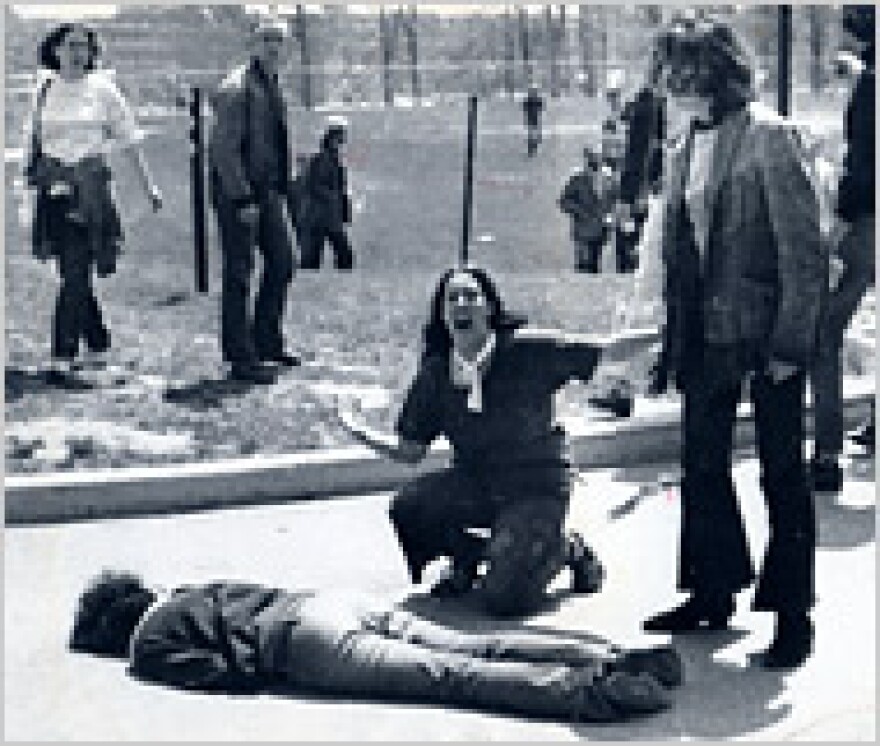In the spring of 1970, college campuses across the nation erupted in protests, mainly against the escalation of the war in Vietnam. We remember May 4th, the day Ohio National Guardsmen opened fire on demonstrators at Kent State University, killing four students and wounding nine. Only ten days later, another campus shooting left two dead and a dozen injured at a historically black college in Mississippi, but that event is not part of our collective consciousness.
Rediscovered Radio’s Jocelyn Robinson found archival tape of interviews recorded within hours of the tragedy that took place 44 years ago today.

We remember May 4th, 1970. We remember that image of an anguished Mary Ann Vecchio kneeling next to the body of murdered Kent State student, Jeffrey Miller. We remember, too, the grim lyrics of by Crosby, Stills, Nash, & Young.
And yet, students today, even those at historically black colleges and universities such as Central State, don't know what happened on May 15th, 1970 at Jackson State College in Mississippi.
Accounts vary on why law enforcement was called to campus that day. Students were agitated. Over several days there’d been reports of rocks thrown at white motorists on Lynch Street, a main thoroughfare running through campus. Even more significant than demonstrations against the war, racial tensions in Jackson were escalating.
Just after midnight, city police and state troopers used deadly force against unarmed students gathered outside a women’s dorm. A half-minute barrage shattered windows and blasted concrete walls. Phillip Lafayette Gibbs, a 21-year old junior, and James Earl Green, 17, a high school senior walking home from his job at a nearby grocery store, were killed.
There is no iconic photograph, no folk rock anthem to remind us of what happened at Jackson State College.
In the WYSO Archives, though, there’s an 18-minute documentary, with phone interviews recorded with witnesses just hours after the shooting. There’s no narration. The speakers, including several obviously shaken Antioch students, aren’t identified. We don’t know who produced it or when it aired, and some of the audio is difficult to understand. Even still, the tape is chilling.
Dr. Kevin McGruder, professor of history at Antioch College, listened to the documentary.
"When you really get to the core of it, it's even something different than violence; it's how life is valued, that black life is not valued in the same way as white life."
"It’s very clear to the people who were there that it just made no sense, the whole thing. And in the context of Kent State, which also made no sense, the level of violence is just almost unbelievable, if there weren’t these accounts of it, particularly to bring those kinds of firearms to a college campus. It really sounded like the authorities were trying to spark something, and that’s not necessarily surprising, but its disturbing. I mean, when you really get to the core of it, it’s even something different than violence; it’s how life is valued, that black life is not valued in the same way as white life. So if black life was valued in the same way as white life, it would have been unthinkable to bring out the heave artillery to deal with students."
A month after the shootings, President Richard Nixon appointed a commission to investigate campus unrest and the heavy-handed responses to it. That fall, the resulting report concluded that the Kent State shootings were “unnecessary, unwarranted, and inexcusable.” In the case of Jackson State, the extreme firepower used was found “unjustified.” But no one was convicted in the Mississippi murders.
Major support for Rediscovered Radio comes from the Ohio Humanities Council and the Greene County Public Library.










